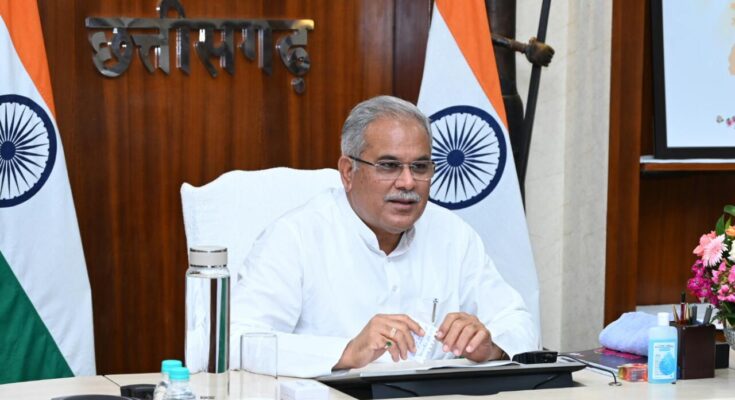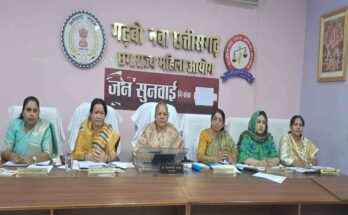Special initiative to promote commercial plantation in Chhattisgarh
Target of planting 15 crore trees in 1 lakh 80 thousand acres in 5 years under Chief Minister’s Tree Estate Scheme
So far, more than 30 thousand acres of
private land of about 20 thousand beneficiaries have been registered for plantation.
Annual income of farmers from 15 to 50 thousand rupees per acre
Preparations completed by Forest Department
Raipur, 20 March 2023
On the occasion of World Forestry Day on March 21, Chief Minister Bhupesh Baghel will launch the state government’s ambitious “Mukhyamantri Vriksha Sampada Yojana” with the aim of promoting commercial plantation in Chhattisgarh at 12 noon. Forest and Climate Change Minister Mr. Mohammad Akbar will preside over the programme. On this occasion, Parliamentary Secretaries, Shri Shishupal Sori and Shri Chandradev Prasad Rai will also be present. On this occasion, Chief Minister Mr. Baghel will also hold discussions with the beneficiaries of ‘Mukhyamantri Vrikshasampada Yojana’ in various forest divisions through video conferencing.
Chief Minister Mr. Bhupesh Baghel has announced the implementation of this scheme in view of the immense possibilities of promoting the commercial use of trees in the state. Under this scheme, for the purpose of increasing the income of the farmers, commercial plantation is to be done on their land with the consent of the farmers.
Target of planting 15 crore trees in 1 lakh 80 thousand acres in 5 years under the plan
Panchayat and land contract holders can take advantage of this scheme. The state government has set a target of planting a total of 15 crore trees in an area of 36 thousand acres in one year and 1 lakh 80 thousand acres in five years. Under this scheme, the state government will give 100 percent subsidy for plantation up to 5 acres and 50 percent financial subsidy for plantation in more than 5 acres. The government will also decide the minimum purchase price for the purchase of identified tree species. Trees of all species planted in 5 years are likely to be worth Rs 10,000 crore when they mature. Through this scheme farmers are expected to earn Rs 15,000 to Rs 50,000 per acre per year. Apart from this, farmers will also get additional income through carbon credits. As per the instructions of Forest and Climate Change Minister Mr. Mohammad Akbar and under the guidance of Mr. Manoj Pingua, Principal Secretary, Forest Department, by the Forest Department
This year, 12 species of trees will be planted in 30 thousand acres of land in the state.
In this regard, Principal Chief Conservator of Forests and Chief of Forest Force Mr. Sanjay Shukla said that under the Mukhyamantri Vriksha Sampada Yojana, 12 types of trees will be planted in 30,000 acres of land in the state this year. Out of these, Clonal Eucalyptus in 17 thousand 182 acres, Rootshoot Teak in 6 thousand 456 acres, Tissue culture in 2 thousand 617 acres, Sandalwood in 1 thousand 462 acres, Melia dubia in 8 hundred 34 acres, Normal bamboo in 7 acres. In 1037 acres, tissue culture bamboo in 607 acres, Rakta Chandan in 126 acres, Amla in 43 acres, Khamar in 40 acres, Shisham in 20 acres and Mahaneem in 20 acres. The target has been set.
Interested land owners of all classes will be eligible under the scheme
Under the Mukhyamantri Vriksha Sampada Yojana, all interested landowners of all classes will be eligible. Apart from this, government, semi-government and autonomous institutions of government who want to plant on their own land will be eligible. Similarly, private educational institutions, private trusts, non-governmental organizations, panchayats, land contract holders, who want to plant in their land, will be eligible. The main objective of Mukhyamantri Vriksha Sampada Yojana is to promote commercial tree plantation in the state. Under this, after plantation of commercial species on the lands of all the farmers, government, non-government, semi-government, panchayats, or autonomous institutions of the state, a strong market system by making arrangements for the purchase of forest produce at the fixed support price through cooperative institutions, private companies. etc. is to be ensured.




